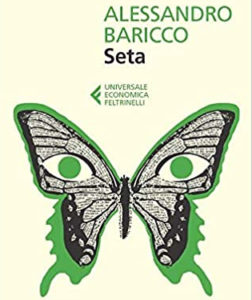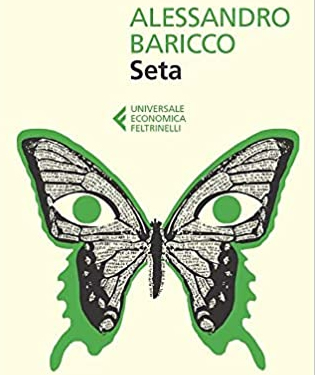Title: Seta
Author: Alessandro Baricco
Published: 1996

Why we read this book in our book club
For this session of our book club, we have chosen Seta by Alessandro Baricco.
We have chosen this book because the story is intriguing and the narrative captivating. It is the curious story of Hervé, at first, appearing uninspiring and not at all special. But as we follow his voyages, we also witness his awakening to life. Baricco’s language is poetic and enchanting. It is not difficult for a student of Italian compared to other authors. In addition, this is a short story, so if – after reading the chapter – you wish for more, finishing this short book will be within reach of any B2 students.
This is what the book club is all about, discovering a new author, reading a carefully chosen excerpt and falling in love with it or not. If the latter is the case, this is also good; you can read something else next time. For each of our book club sessions we pick a new book and select one chapter for you to read.
Seta: the story
Seta is set in the mid-1800 in France in the small village of Lavilledieu in the South of France. It is the story of Hervé Joncour a silk merchant and specifically a silkworm merchant. He is married and has no children. He is a quiet man with no expectations, whose destiny seems to have been decided for him.
After a pandemic which affects the silkworms, Hervé is forced to travel to the far East and visit Japan to illegally purchase silkworms. For the last two centuries Japan has been closed to the external world. During his first travel to Japan, Hervé meets the mysterious Hara Key. He also sees a girl and he falls in love with the idea of her. He returns to Japan multiple times hoping to see her again.
The book tells the story of this idealised and impossible love, but also about the more real one closer to home, which is rediscovered by Hervé towards the end. It talks about the metaphor of travelling and of the awakening of a man to life.
What we will be discussing in this book club
Our book club discussions vary according to the books we read and the contributions of the participants. The moderator provides enough structures to ensure that discussions flow, however, also flexibility and freedom so that participants have enough space to express their ideas.
For this particular book, we will start by focussing on defining the characters, their specific traits and what these mean for the story and for the overall meaning of the book.
We then focus on specific quotes from the book either suggested by the teacher moderator or by the participants. We will discuss what the quotes suggest and what bearing these elements have on the story itself.
During the book club there is a focus on specific language used in the book, and again, both the moderator and the participants will contribute either interesting or new language to analyse or simply to put forward and explain.
Interesting quotes from the book:
“Pioveva la sua vita, davanti ai suoi occhi, spettacolo quieto.”
“Per mille volte cercò gli occhi di lei, e per mille volte lei trovò i suoi. Era una specie di triste danza, segreta e impotente.”
“È uno strano dolore. Morire di nostalgia per qualcosa che non vivrai mai.”
“si chinò su quanto era rimasto della sua vita, e riiniziò a prendersene cura, con l’incrollabile tenacia di un giardiniere al lavoro.”
“Ogni tanto, nelle giornate di vento, scendeva fino al lago e passava ore a guardarlo, giacché, disegnato sull’acqua, gli pareva di vedere l’inspiegabile spettacolo, lieve, che era stata la sua vita.”
The author and the book
Alessandro Baricco was born in Torino in 1958. He studied philosophy at university and at the same time studied piano at the conservatory. His love of music and literature inspired his first book, a paper on Gioacchino Rossini. He published his first novel, the critically acclaimed Castelli di sabbia, in 1991 and has won the Premio Selezione Campiello and the Prix Médicis Étranger. In 1993 he published Oceano Mare which has won the Premio Viareggio and the Premio Palazzo al Bosco. In 1994 he wrote Novecento and Seta was written in 1996.
All his books have been translated into various languages. Baricco has also written numerous papers and articles. He has written and directed for the theatre. He has also created TV programmes on literature such as Pickwick, del leggere e dello scrivere and Totem. In 1994 he created and founded a school of creative writing based in Turin called Scuola Holden. He has also directed a film called Lezione Ventuno.
Seta is one of best-known books by Baricco. This international best seller has been translated into 30 languages. François Girard made it into a film with Michael Pitt, Keira Knightley, and Alfred Molina. The book is a short story written in his unique style, simple and poetic.
Alessandro Baricco has written 13 novels:
- Castelli di Sabbia, 1991
- Oceano Mare, 2993
- Novecento, 1994
- Seta, 1996
- City, 1999
- Constellations, 1999
- Senza Sangue, 2002
- Questa Storia, 2005
- Emmaus, 2009
- Mr Gwyn, 2011
- Tre Volte all’Alba, 2012
- Smith & Wesson, 2014
- La Sposa Giovane, 2015
Further reading
Here are some sources where you can find more information about Alessandro Baricco and his books:
https://www.feltrinellieditore.it/autori/autore/baricco-alessandro/”
https://en.wikipedia.org/wiki/Alessandro_Baricco
How to join the book club
Join our book club! We read selected chapters of a given book and develop speaking in sessions moderated by a native teacher passionate about literature. Click if you wish to know how our book club works. Book your session here.







